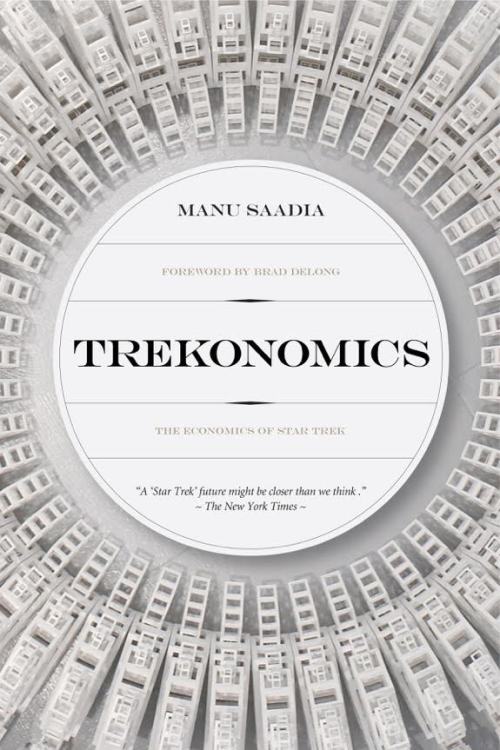Before the untimely demise of SFSignal, I had just started reviewing books for the blog (a writing achievement for me!). They only published one of my reviews before John decided to shutter the site as an active source of sci-fi information. However, kind-hearted as he is, he sent me a few of the books that were on my “to review” list anyway.
The first of those books was the (then) forthcoming Trekonomics, by Manu Saadia. My excitement grew after the book was announced, not because of my Star Trek fandom, but because my analytical side often wandered down the same path as Saadia’s, curious about those off-hand remarks about a future with no money and yet the continuing existence of the Ferengi’s. Wondering how labor is managed when there is no financial incentive to work. Wondering how far away that future really is (I’d love to spend all day writing and painting instead of… project managing).
I’m not sure if it’s a spoiler to note that (according to Saadia) the crux of the utopian economy established by the 24th-century hinges on the invention of the replicator and (more importantly) its availability as a public good.
Saadia takes us on an abbreviated tour of the three main television shows (the movies were action vehicles) that deal with the problems of future economy: TOS, TNG, and DS9. If you don’t know what those acronyms are this probably isn’t the book for you.
Much time is spent discussing the replicators and the freedom they allow a populace unburdened by the necessity to work for wages. Or even the necessity to worry about acquiring anything, from bread to billions. What’s not entirely made clear is how a moneyless society deals with the scarcity of unreplicable goods: houses along the beach in Malibu, for example. There are a few throw-away lines in the show that state people just don’t worry about the acquisition and accumulation of material things anymore since they are, in effect, worthless. But property (certainly a material good) isn’t valued because of its composition (the market value of wood, steel, and glass) so much as its relative geographic position (land in Malibu vs. Marietta). In a 22nd century with nine billion (ST:First Contact gives a population count before the Borg take over the planet) how can there not be even more people wanting to live on the mountaintop or beachfront than there are now?
The simple answer is that the economics of the future exist solely within Starfleet and there’s a good reason trips to Earth are rare on the show. Since anyone worthy of praise is inculcated into the organization in some way or another their reward (ostensibly of respect and position) is granted by that organization. Genius is primed early and there are no longer Leonardo-like masterpiece makers hitting their stride later in life.
However, Starfleet admirals have to live somewhere too, don’t they? People still live in Central Park West, right? Are those homes occupied by the families that own them now? Is there a 5th generation Trump still gilding the interiors of prime Manhattan real estate in the year 2365? That seems to run against the grain of a show that repeatedly scoffed at the barbarism of our present. As Riker says in The Neutral Zone after meeting some unfrozen folks like us: “makes me wonder, how our species ever survived the twenty-first century.”
It’s clear to most that perpetuating the capitalist gains obtained by a slim few in part through colonialism, slavery, and racism would not be an objective of the Federation. Again, the show creates a caveat with a fictional world war three happening in the late 21st century, wiping out most of the property and the owners. But not all. And when the ragtag remnants of humanity rebuild you’d think the first thing they’d do is fight over who gets to live on the beach. The replicator isn’t even invented until at least a hundred years after the great war, so the concept of scarcity lives on and so would property for a good time to come.

In Star Trek Generations we meet Kirk in the Nexus enjoying time in his retirement at his log cabin in an idyllic mountain setting, with no plebians around for miles. The point is made clearer when one learns that some of the scenes (though not of the house itself) were shot at the actor’s real property. In a fascinating symmetry of the show with reality Shatner’s wealth as an actor translates roughly to that of the venerated retired Starfleet Admiral he famously portrays. Both enjoy the very real material wealth of success, despite promises of an egalitarian utopian society.
However, this disparity between ideals and reality in Star Trek becomes more believable when considering what Saadia barely touches on: the outlawing of genetic engineering.
Born dumb? Too bad, you have to stay dumb. Born with sickle cell? No Starfleet for you, Benjamin Sisko! I kid, I kid. But seriously, Geordi is born nearly blind and the solution is to give him future glasses which leave him in constant pain. They could just order up some new eyes from the replicator, but…that’s illegal. Because genetic tampering would give folks unfair advantages. Wait, what? We’ve already established that any beneficial technology is essentially available to everyone in this world. So why artificially handicap anyone, isn’t that a punishment? Since certain unfavorable genetic traits are linked to ethnicity isn’t that a racist policy?
We’ll table that for a moment because obviously on the television shows the genetic tampering law was another necessary cheat of the structure of the show to tackle the inevitable question of why the principle actors would age on a show about a utopian future. As Beverly Crusher explained in the same episode (The Neutral Zone) that made clear the future’s disdain for the economics of the past: “(In the 20th Century) People feared dying. It terrified them.”
Really, Beverly? I dare you to put on a red shirt and say that! No satisfactory explanation is ever given as to why three hundred years later nobody is afraid of death (from natural causes).
Unless there isn’t any!
Back in the real world, we all know that with the dual inventions of machines that can scan and store genetic code from living beings down to the level of individual electron orbits (the transporter pattern buffer) and then recreate those atoms perfectly in every detail in nearly real-time (the replicator) death would be nonexistent except for freak accidents or suicides.
The replicator and transporter machines would not be created for the purposes we see on the show. The first thing anyone would use a replicator for is to grow new organs for cancer patients and the first thing a pattern buffer would do is scan the patient’s genetic code and remove the gene that leads to cancer in the new organ.
Immortality would be granted for only a few at first in our economy. However, in the 24th-century we’re led to believe that any and all technology is free to everyone, especially (and because of) the replicator. No need for doctors to implant your new organs, by the way, we can remove the old and implant the new almost simultaneously via the transporter. Perhaps making transporter masters the most respected occupation in the galaxy. They really should have had a show about Chief O’Brien running everything, right?
What?
Yeah, that’s right: Colm Meaney would finally get to be the big star in the real Star Trek.
However, late in the book, when Trekonomics crosses over into a discussion of our actual future it lacks any significant discussion of the immortality that the utopian society would enable (because of the very same technology that negates the need for money).

Was this deliberate? Immortality throws a wrench into the central tenet of Trekonomics. Without aging, Picard would never retire to the family vineyard. Those in power when immortality begins may never leave. After all, they’ve established their position only because they enjoy it so much. People retire in our world because they’re too tired to do what they love or they (most of us) never really liked trekking to an office in the first place.
One way around this is to enact term limits. However, that seems a highly inefficient way of managing assets whose sole quality is an extreme proficiency for their profession. It would also be extremely dangerous to everyone else on the starship if a captain of fifty years is forced to retire. The learning curve for a successor would be enormous. And then what? The retired captain has to go do something else, but would probably be first in line for many other things, creating a shuffling of cards like we actually have already in Washington (compare the names in the two Bush presidential administrations, or consider that Bill Clinton’s wife is going to be our president in 2017).
So that proposed economy based on status becomes much tighter or nonexistent. Who inherits Kirk’s mountain retreat when he sacrifices himself to save the galaxy? (not sorry for spoiling, that movie came out before this year’s college graduates were even born)
Any fight at all for status would be much more bloodthirsty or futile for many.
Or perhaps Saadia is right anyway. If more people want to be Starfleet captains, we just build more Enterprises. As Picard says after setting the self-destruct sequence on the Enterprise-E: “Plenty of letters left in the alphabet.”
In a world where there is no cost for building a starship and the only goal of said ship is to explore an infinite galaxy, infinite economic opportunity exists.
We still have the problem of who gets to live in the fancy houses just fifty miles of the center of the universe (Starfleet headquarters) in Monterey Bay.
Perhaps a democratic vote. The ultimate expression of status, the kid voted by his peers most popular. Is Star Trek ultimately just Gene Roddenberry’s fantasy about escaping back to childhood? The future will be just like elementary school: Everything is free and you’re led to believe you can do whatever you want with your life.
So really we didn’t fall in love with a grand vision of the future. We’re being nostalgic for our past. But it’s not a collective past. Star Trek is a first world problem. Privileged Americans who never wanted to grow up. It’s probably why when I talk to friends who escaped childhood poverty (or state-sanctioned murder) in South America they have little interest in the Star Trek universe. They aren’t rejecting a bright future, they’re unable to feel at home in a comfortable past.



